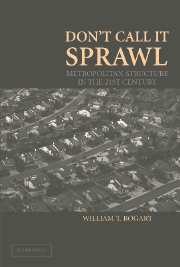Book contents
- Frontmatter
- Contents
- Acknowledgments
- 1 The World of Today
- 2 Making Things Better: The Importance of Flexibility
- 3 Are We There Yet?
- 4 Trading Places
- 5 Downtown: A Place to Work, a Place to Visit, a Place to Live
- 6 How Zoning Matters
- 7 Love the Density, Hate the Congestion
- 8 Homogeneity and Heterogeneity in Local Government
- 9 The World of Tomorrow
- Notes
- References
- Index
9 - The World of Tomorrow
Published online by Cambridge University Press: 02 December 2009
- Frontmatter
- Contents
- Acknowledgments
- 1 The World of Today
- 2 Making Things Better: The Importance of Flexibility
- 3 Are We There Yet?
- 4 Trading Places
- 5 Downtown: A Place to Work, a Place to Visit, a Place to Live
- 6 How Zoning Matters
- 7 Love the Density, Hate the Congestion
- 8 Homogeneity and Heterogeneity in Local Government
- 9 The World of Tomorrow
- Notes
- References
- Index
Summary
These are the last things. A house is there one day, and the next day it is gone. A street you walked down yesterday is no longer there today. Even the weather is in constant flux. A day of sun followed by a day of rain, a day of snow followed by a day of fog, warm then cool, wind then stillness, a stretch of bitter cold, and then today, in the middle of winter, an afternoon of fragrant light, warm to the point of merely sweaters. When you live in the city, you learn to take nothing for granted. Close your eyes for a moment, turn around to look at something else, and the thing that was before you is suddenly gone. Nothing lasts, you see, not even the thoughts inside you. And you mustn't waste your time looking for them. Once a thing is gone, that is the end of it.
Paul Auster (1987, 1–2)We now come to the end of our tour through twenty-first-century metropolitan areas. It would be wrong, though, to depart without an eye toward the future. After all, a recurring theme has been that there is too much attention paid to the current situation at the expense of future developments. At the same time, there is insufficient understanding that the future will be strongly influenced by the present, which in turn reflects decisions made in the past.
- Type
- Chapter
- Information
- Don't Call It SprawlMetropolitan Structure in the 21st Century, pp. 181 - 192Publisher: Cambridge University PressPrint publication year: 2006



